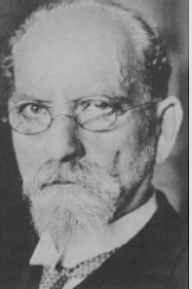Some say 20th-century philosophy began with Edmund Husserl. He invented a new way of looking at the world. He called it 'phenomenology', meaning "how things appear". Husserl wanted to find a foolproof method of measuring reality. Like Descartes, he believed that consciousness is the key.
And like Kant, he understood that consciousness is shaped by how the mind works. Husserl also realized something else about consciousness - it doesn't exist in a vacuum. It is impossible to think nothing. He had discovered that:
"ALL consciousness is
consciousness of something"
 Husserl spent 40 years of his life as a philosophy professor. Before this he was already highly qualified in mathematics and astronomy - subjects that nurtured a desire to apply scientific method to philosophy.
Husserl spent 40 years of his life as a philosophy professor. Before this he was already highly qualified in mathematics and astronomy - subjects that nurtured a desire to apply scientific method to philosophy.
Husserl wanted to strip consciousness down to its essence to reveal how it shaped reality. Rather than doubting everything, like Descartes, Husserl's method was to push to one side all assumptions about something and look at it afresh. He would then see what was left. He found that consciousness "sees" a unity in things. For example when looking at one side of a box, the mind still anticipates the whole box.
Husserl applied the same method to abstract ideas such as time. He found that time is experienced as eternal "now", in a flow from the past to the future - like hearing a single note, but knowing it is a part of a song.
Likewise, space is always "here" - wherever a person happens to be.
Both "here" and "now" are personal to each individual consciousness, but everybody experiences time and space in exactly the same way.
"Clocks tell you nothing about the real nature of time"
He used the ideas of Descartes and Kant to develop his own ideas on reality
Husserl "stepped" back from everything to observe its reality
He taught at Freiburg University, Germany but because of his Jewish parentage was excluded after Hitler rose to power.
"Philosophy can be conducted like a scientific experiment"


 Husserl spent 40 years of his life as a philosophy professor. Before this he was already highly qualified in mathematics and astronomy - subjects that nurtured a desire to apply scientific method to philosophy.
Husserl spent 40 years of his life as a philosophy professor. Before this he was already highly qualified in mathematics and astronomy - subjects that nurtured a desire to apply scientific method to philosophy.